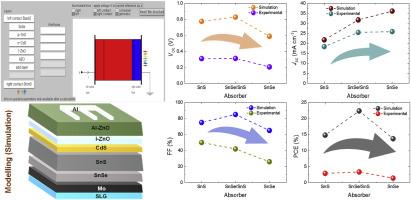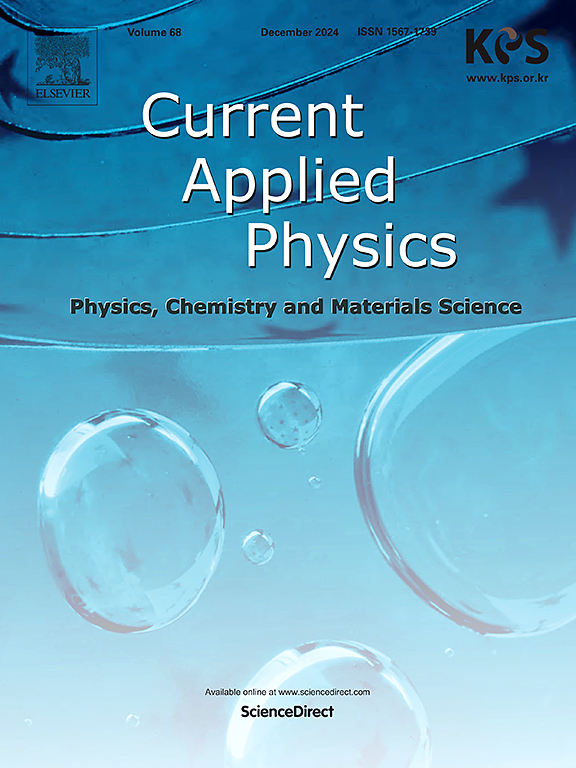A comprehensive numerical study of bilayer SnSe/SnS absorber based solar cells
IF 2.4
4区 物理与天体物理
Q3 MATERIALS SCIENCE, MULTIDISCIPLINARY
引用次数: 0
Abstract
Herein, we present the simulation (using the SCAPS-1D program), of a bilayer absorber solar cell. First, we numerically studied the bilayer model using our experimentally observed parameters and investigated the results. The results from the bilayer absorber (SnSe/SnS) numerical analysis were then compared with a single (SnS and SnSe) absorber modeling. The optimized device with a bilayer absorber exhibited the highest performance, with a photo conversion efficiency (PCE) of 22.35%. In comparison, the single SnS and SnSe absorbers achieved a PCE of 14.79% and 13.69%. Furthermore, we compared this numerical study with our previous study having the same configuration. Although there was a significant difference in performance between the simulated and experimental studies, the outcomes of the fabricated devices exhibited similar trends to the simulations. Finally, we attempted to determine the key parameters responsible for the reduced performance in the experimental study.

基于双层锡/锡吸收器的太阳能电池的综合数值研究
在此,我们介绍了双层吸收太阳能电池的模拟(使用 SCAPS-1D 程序)。首先,我们使用实验观察到的参数对双层模型进行了数值研究,并对结果进行了调查。然后将双层吸收器(SnSe/SnSe)数值分析的结果与单层(SnS 和 SnSe)吸收器模型进行比较。采用双层吸收器的优化器件性能最高,光转换效率(PCE)达 22.35%。相比之下,单层 SnS 和 SnSe 吸收体的 PCE 分别为 14.79% 和 13.69%。此外,我们还将这项数值研究与之前采用相同配置的研究进行了比较。虽然模拟研究与实验研究在性能上存在显著差异,但制造出的器件结果显示出与模拟研究相似的趋势。最后,我们试图确定造成实验研究中性能降低的关键参数。
本文章由计算机程序翻译,如有差异,请以英文原文为准。
求助全文
约1分钟内获得全文
求助全文
来源期刊

Current Applied Physics
物理-材料科学:综合
CiteScore
4.80
自引率
0.00%
发文量
213
审稿时长
33 days
期刊介绍:
Current Applied Physics (Curr. Appl. Phys.) is a monthly published international journal covering all the fields of applied science investigating the physics of the advanced materials for future applications.
Other areas covered: Experimental and theoretical aspects of advanced materials and devices dealing with synthesis or structural chemistry, physical and electronic properties, photonics, engineering applications, and uniquely pertinent measurement or analytical techniques.
Current Applied Physics, published since 2001, covers physics, chemistry and materials science, including bio-materials, with their engineering aspects. It is a truly interdisciplinary journal opening a forum for scientists of all related fields, a unique point of the journal discriminating it from other worldwide and/or Pacific Rim applied physics journals.
Regular research papers, letters and review articles with contents meeting the scope of the journal will be considered for publication after peer review.
The Journal is owned by the Korean Physical Society.
 求助内容:
求助内容: 应助结果提醒方式:
应助结果提醒方式:


